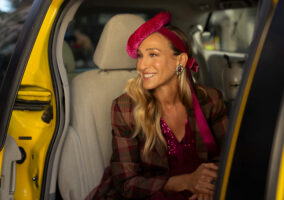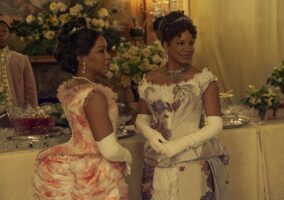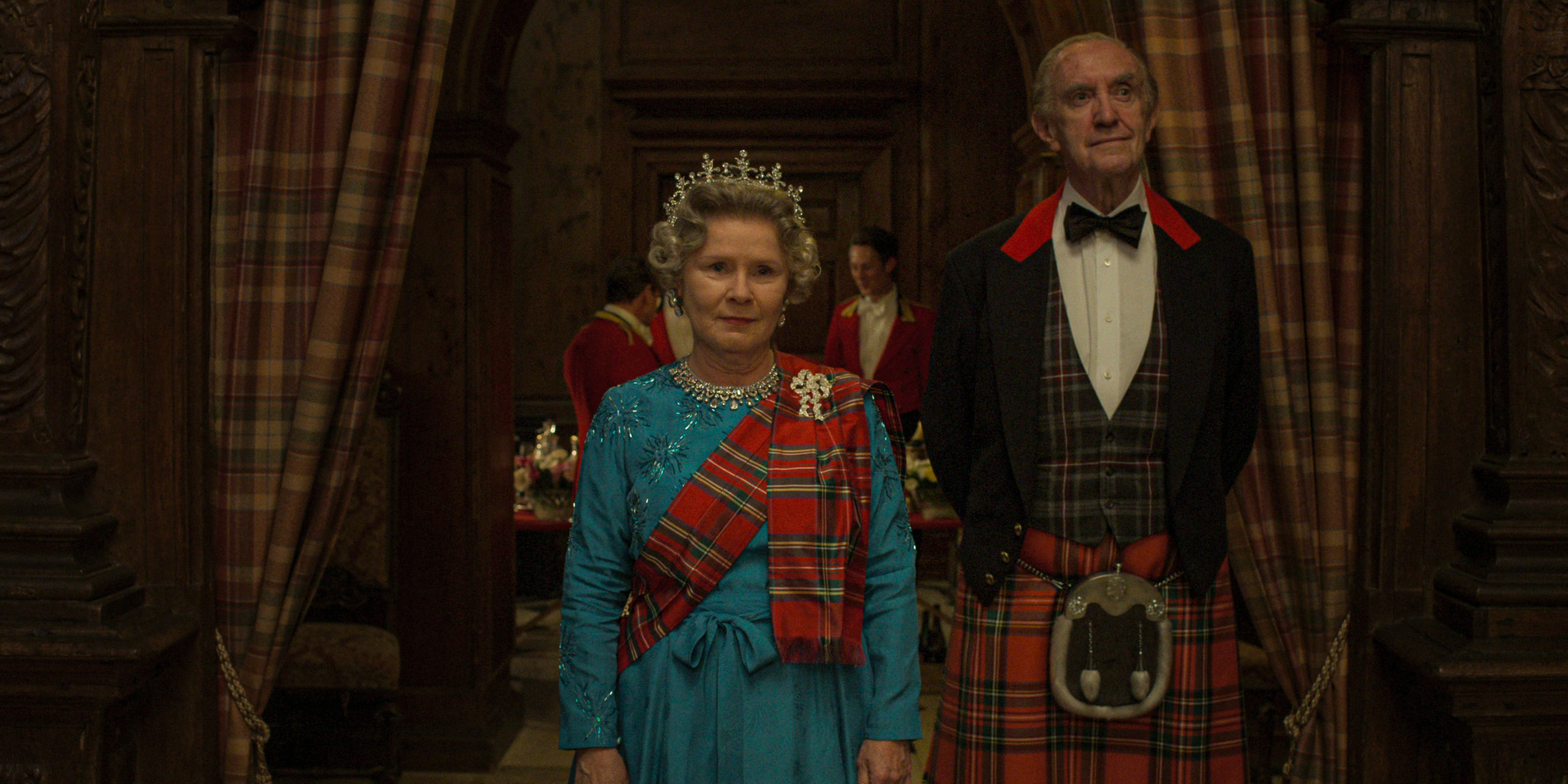
Episode 1: “Queen Victoria Syndrome”
And we’re off! With Claire Foy stepping into the sensible shoes once again to kick off the season. We think the story benefits from these sorts of callbacks with old cast members or previously seen characters. It won’t be the last time it’s done this season and we felt there was a distinct effort to tie Imelda Staunton’s Elizabeth and Jonathan Pryce’s Philip more directly to Foy’s and Matt Smith’s versions rather than Olivia Colman’s and Tobias Menzies’. This works for us because we’re entering the beginning of the period where Elizabeth starts being seen as an institution rather than a person; someone who’s been Queen for as long as anyone can remember. We see Foy as Elizabeth during the launch of the royal yacht Britannia at the start of Elizabeth’s reign. Foy is effortlessly wonderful at portraying the young Elizabeth’s stiffness and restraint, momentarily looking taken aback when the crowd cheers for her, uncomfortable with such an outpouring of emotion. Imelda Staunton is introduced in the role much in the same way Olivia Colman was, in an extended scene commenting on how old she looks now as she goes through her annual physical, complete with a corn pad on her toe and a discussion of her weight gain. The royal doctor asks about her summer plans and if Balmoral is her favorite home. She responds by telling him that it’s a personal question (we do love when the show remembers that these people are generally pretty awful to their employees) but that she has one home she loves above all others, evidently the royal yacht. Meanwhile, Charles is being told of how badly his mother is currently polling and how the public sees her as old and irrelevant, a point which will be made repeatedly not only this episode, but through the entire season. Charles is thrilled to hear that his numbers are great and that the public is looking forward to his reign as King; so much so that half the public thinks the queen should abdicate. “As you know,” he is told, ” A big part of your appeal as future king is the prospect of the Princess of Wales as queen.” “Yes,” he replies with some resignation. His staff has alerted the press to the Waleses’ upcoming holiday together and have billed it as a second honeymoon. Diana is told of this by her private secretary and is delighted. Right from the jump, Elizabeth Debicki is astonishing in the part. Diana is one of those figures where the mimicry has to be a big part of whether the audience will accept the actress in the part and Debicki has every batted eye and tilted head down pat. Dominic West slips into the role of Charles with surprising ease and the lack of a resemblance wasn’t really an issue for us – especially since the cast has always been populated by actors much better looking than the people they’re portraying.
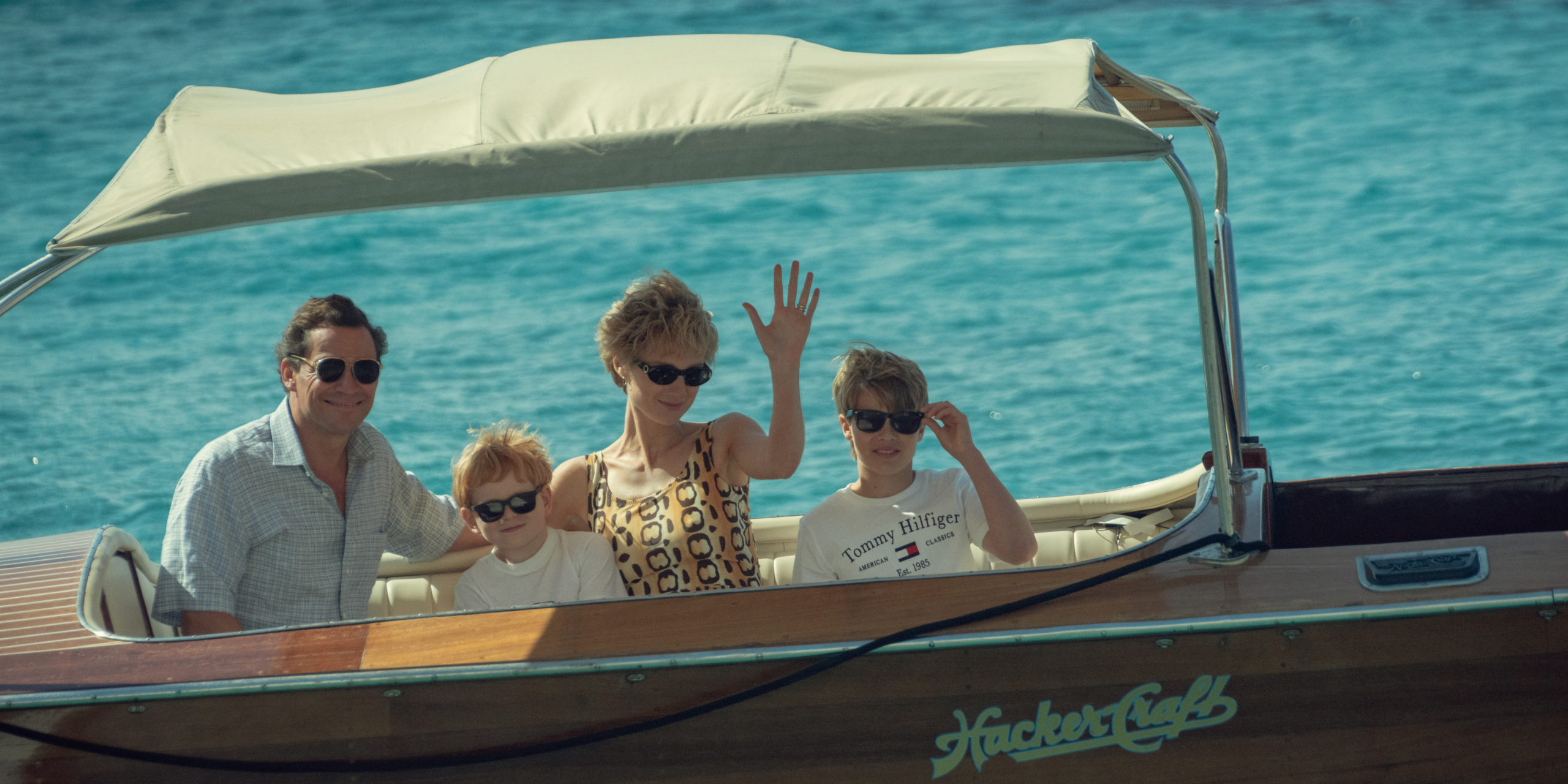
Diana is annoyed that Charles has invited some of his Highgrove social circle on the trip: his cousin Norton, the Earl of Mountbatten, whose grandfather died in an IRA terrorist attack last season, and Norton’s wife Penny played by Natasha McElhone. Their daughter Leonora is Diana’s goddaughter, whose cancer is in remission. Several aspects of this introduction will launch storylines later in the season. On the flight, Diana tells Charles how happy she is that they’re all together and he responds affectionately. Détente is currently the order of the day, but it’s crystal clear that it’s a precarious situation. “Shall we give them some of the old magic?” Charles asks her as they face a wall of rabid photographers. “Let’s blow them away,” she responds as he kisses her theatrically. On the yacht, which is stacked with Charles’ friends, the Prince outlines his itinerary of museums and historically significant spots while Diana pouts and asks whether she’ll get any beach or shopping time, once again underlining haw fatally ill-suited they were for each other. Little Prince Harry defuses the tension and Diana later thanks him for sticking up for her, which is a kind of fucked-up thing to lay on your kid. Meanwhile, Charles takes every opportunity to whine to his friends about how unhappy he is in his marriage, including to the friends whose kid had cancer. So far, no one’s particularly likeable.
Back on the Britannia, Elizabeth is thrilled to read of Charles and Diana’s PDA and leaves Prince Philip for a day of rather tedious engagements (we tend to think the show is overstating the matter, since Elizabeth even at the height of her rein wasn’t doing a half dozen engagements in a routine day) while he goes down below to harass the crew about why he keeps hearing “strange mechanical noises.” He tells Elizabeth at dinner that night that Britannia is in bad need of repairs. “In many ways, she’s obsolete,” he says while holding the Metaphor Hammer. “Don’t say that,” she says in a wounded tone. He suggests she take it up with the new Prime Minister John Major when he comes to Balmoral. The Times releases its poll about the monarchy and everyone on the Britannia scrambles to make sure the Queen doesn’t see it, which strikes us a bit of a waste of time. “She never stops, she never complains, she never puts a foot wrong,” says Prince Philip in frustration at the news. “She’s utterly magnificent and they print rubbish like this.” Charles excitedly tells his secretary to arrange a meeting with the Prime Minister. We’re introduced to Caludia Harrison as Princess Anne, who’s utterly perfect in the role. She notices the Queen’s new equerry and Elizabeth reminds her that she’s married. “Only technically,” the Princess replies.
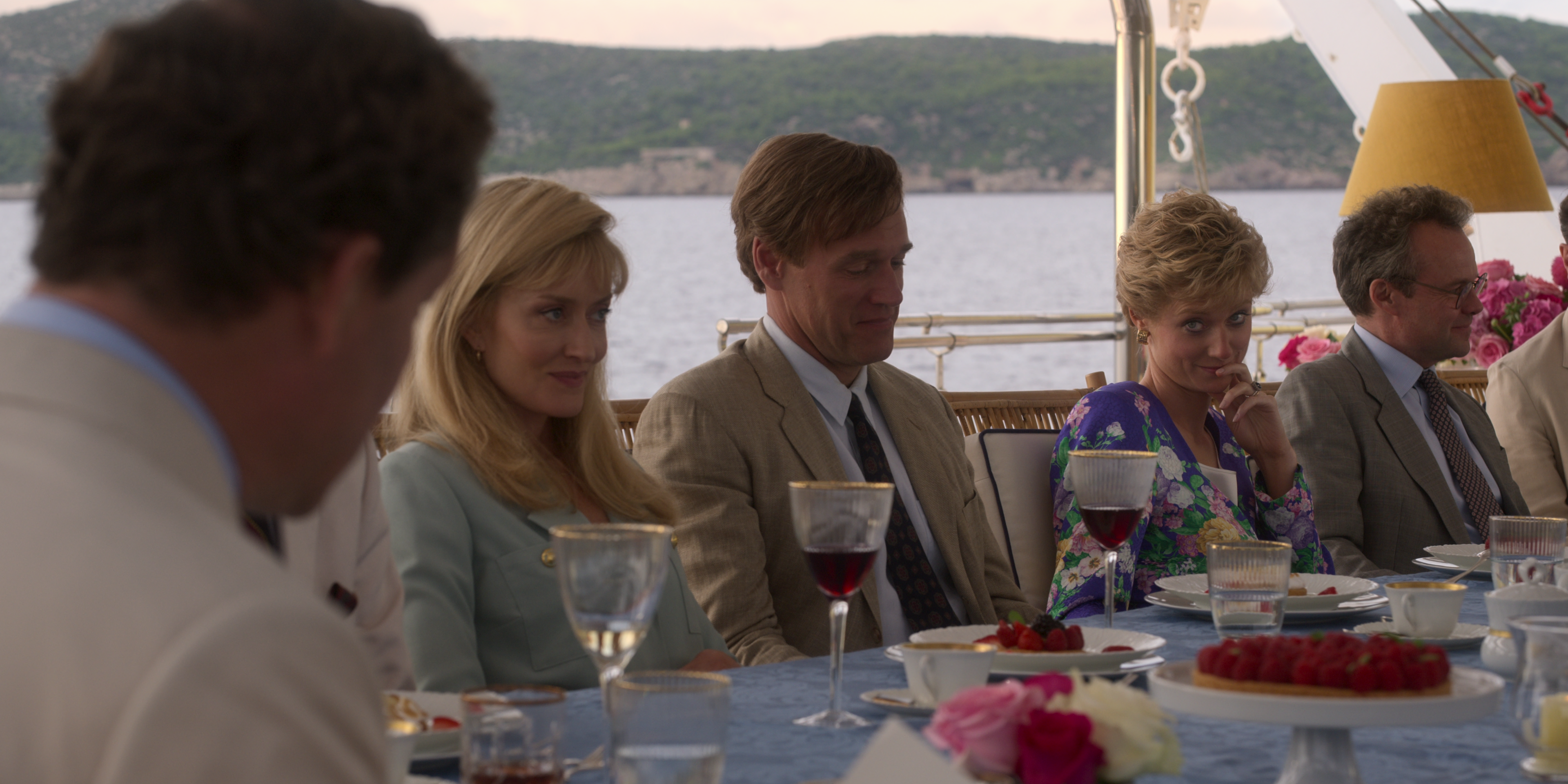
In Italy, everybody literally clears the deck as Charles and Diana have a big fight when he tells her that he has to cut the holiday short because he’s due to give a lecture at Oxford. “It’s not the university,” she sneers. “It’s a summer school for tourists.” Not that Charles deserved some sort of adoring wife, but the difference between Diana and Camilla is that the latter knew that the Prince has a fragile ego and that disparaging his intellectual pursuits is just about the worst thing anyone can do to him. Charles meets with John Major and The Crown breaks two of its longstanding rules: showing the Prime Minister meeting with someone other than the Queen for the first time and having a prime minister who’s distractingly hot. For all the talk about how Dominic West was too attractive to play Charles, you can go ahead put him in a white wig and gigantic glasses, but Jonny Lee Miller is incapable of being anything less than cute. Major doesn’t seem particularly impressed by the Prince and gently rebuffs him when he tries to make an issue of the recent polling.
The family converges on Balmoral for the Ghillies Ball and the Queen wants to know why everyone’s being weird around her. She is eventually given a copy of The Times to read. During the Prime Minister’s visit, she brings up the poll and says she’s thrilled to be compared to Queen Victoria, who was known for her stability, constancy and sense of duty. She segues immediately into the repairs needed for the royal yacht and is not happy to hear the Prime Minister suggest that such an expense would not be a good idea for the government to take on. She claims that it is not a luxury, but an essential part of the monarchy, an extension of herself. “She is a floating, seagoing expression of me,” says the woman whose face is on all the stamps and money.
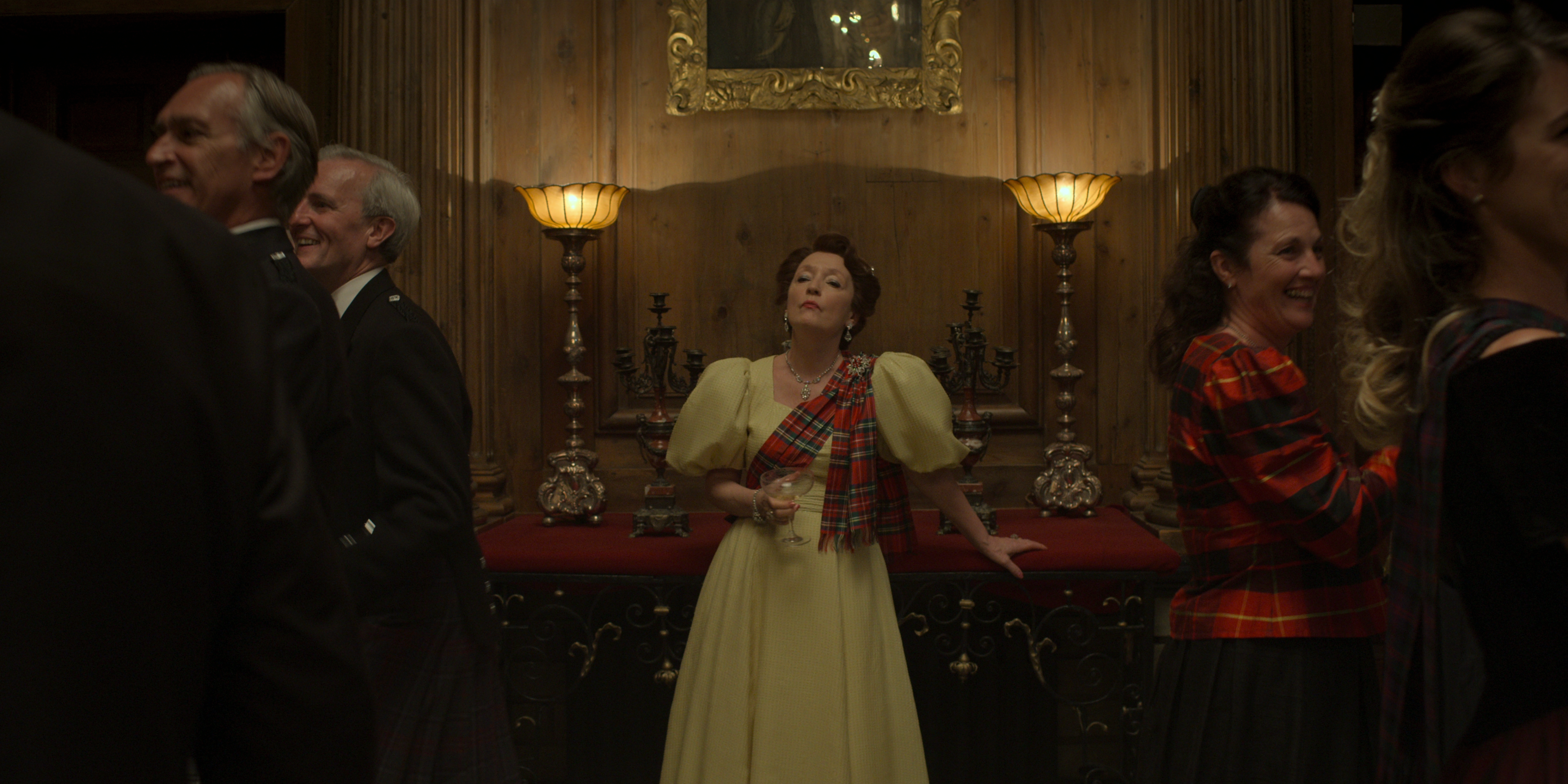
At the Ghillies Ball, the whole panorama of Windsor dysfunction is on display for the Prime Minister. FYI: Most of the costumes in this scene are modeled on what the family wore to the 1990 Ghillies Ball, which was filmed for a documentary about The Queen. After Prince Philip berates and buttonholes him over the royal yacht, Princess Margaret helpfully scrolls through the Wikipedia entry on the Ghillies Ball and more or less recites it to him. It feels like there are more than the usual number of these “educating the American audience” moments this season and they’re not particularly well-executed. “Sometimes these old things are too costly for repairing,” Charles says to him regarding the royal yacht, all but putting a finger to his nose as he does so. Diana takes him aside and treats him like her therapist, unloading completely about how lonely and depressed she is. He later declares to his wife that the senior royals are deluded and out of touch and the junior royals are feckless and entitled. It’s a tale as old as time (you could say the exact same thing about the royals today) and it’s also, not coincidentally, the entire theme of the season.
Episode 2: “The System”
We groaned during the opening scene of this episode, with an impatient and vaguely offensive (“Do you understand me?”) Prince Philip talking to a Polish reporter about his relatively newfound love of carriage races; yet another of those rather silly-looking pastimes the English aristocracy tend to revel in. While explaining how he went from polo playing to carriage-riding (the upshot is that he got too old for the former), he is repeatedly distracted by a hawk flying overhead. Showrunner Peter Morgan loves his animal metaphors (the Queen trying to save a stag from being shot only to discover that it was a metaphor for her daughter-in-law’s death in The Queen being the prime example), so we suppose we should take the hawk as an expression of Philip’s desire to … we don’t know, fly free or something. Frankly, every time they do these once-a-season “Philip is restless/the marriage is in trouble” episodes of The Crown there are diminishing returns. Watching the young Elizabeth and Philip hammer out the terms of their partnership in the first season was fascinating to watch, but in the end, their marriage went down as one of the most successful partnerships of the century. Whatever else you can say about Elizabeth and Philip, they were quite clearly devoted to each other and quite obviously able to make their marriage work. There’s no real tension in these episodes because none of it feels particularly high-stakes. Additionally, in order to create the sort of tension an episode like this needs, the characters have to suddenly act very uncharacteristically. Just last episode, Philip was calling his wife “magnificent,” but apparently he now feels she’s dull and incurious. Sure, marriages have their ups and downs – especially chronically long ones like this – but the shift from supportive Philip to impatient Philip in the space of one episode felt a little jarring and unearned. All we could think was “Oh. We’re here again.”
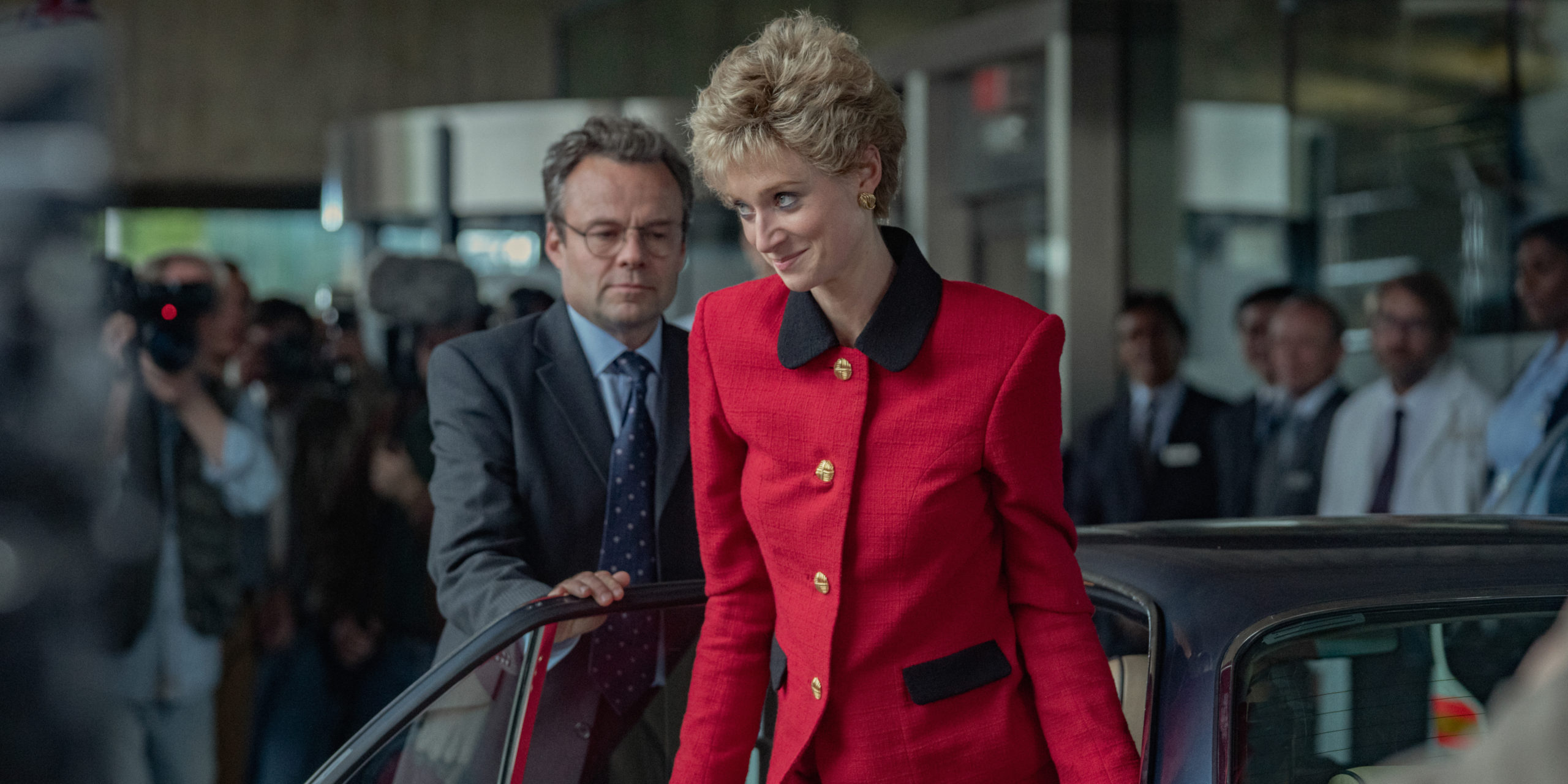
To be fair, the script makes it very clear that the marriage is in no real trouble, even if Philip is his usual impatient self and seems a little sick of his wife. After Norton and Penny’s daughter’s funeral, he expresses gratitude for his life and tells Elizabeth she makes him a better person. “Isn’t that the point of marriage?” she asks. Pryce and Staunton have settled into their roles with a quickness the previous Elizabeths and Philips didn’t manage; a testament to their decades of skill. Elizabeth suggest he go and visit the grieving Norton, who is his godson. One thing about the Penny Knatchbull storyline: it’s really the first time the series has explored the fact that there is a large, extended family surrounding the Windsors and that they’re all fairly close to one another. Watching the series, you’d think Elizabeth only spoke to her mother and Princess Margaret for her entire life, but she – and Philip – always enjoyed deep friendships and had countless godchildren among the various cousins, nieces and nephews. Philip goes to visit his godson only to find that he’s away for the day. He spends his time with Penny instead and they begin to develop a bond. They talk about the disappointment with their respective spouses and ruminate on couples growing apart in marriage. This, again, fuels the storyline but doesn’t quite scan, given Philip’s constant declarations of love and devotion to his wife. He urges Penny to find a new passion in her life and when she shows him the broken-down carriage in her possession, he invites her to take part in his own passion, so to speak.
Diana visits a children’s cancer ward at the behest of her friend Dr. James Colthurst, in a scene that accomplishes two things; first, it introduces Andrew Morton, who will go on to write the definitive book about the Waleses’ marriage (with a good deal of help from Colthurst), which will fuel the storyline for the rest of the second. The second, more important thing this scene does (and very well, we might add), is show just how insanely chaotic the energy was surrounding Diana. Modern royal watchers may not understand the massive differences between how Diana was greeted by the press and public (feverishly and, in retrospect, ominous in their fervor) and how figures like Princess Catherine or Meghan Markle are treated (MUCH more restrained in comparison). We’ve covered a lot of the latter two over the last decade and it’s extremely rare to see the press and public screaming and clawing at them the way they did whenever Diana went out. Later, James calls Diana to tell her that Morton approached him about his proposed book. After he hangs up, she notices some clicking on the line and clearly feels that she’s being bugged and watched. While the show tends to take a critical eye to such suppositions on Diana’s part, we think there’s a pretty good case to be made that the chaos of Diana’s public life provided more than enough fuel for her private paranoia. If you’re lonely and rejected in private but maniacally pursued like a fox during a hunt every time you step outside, it can seriously screw with your self-perception.
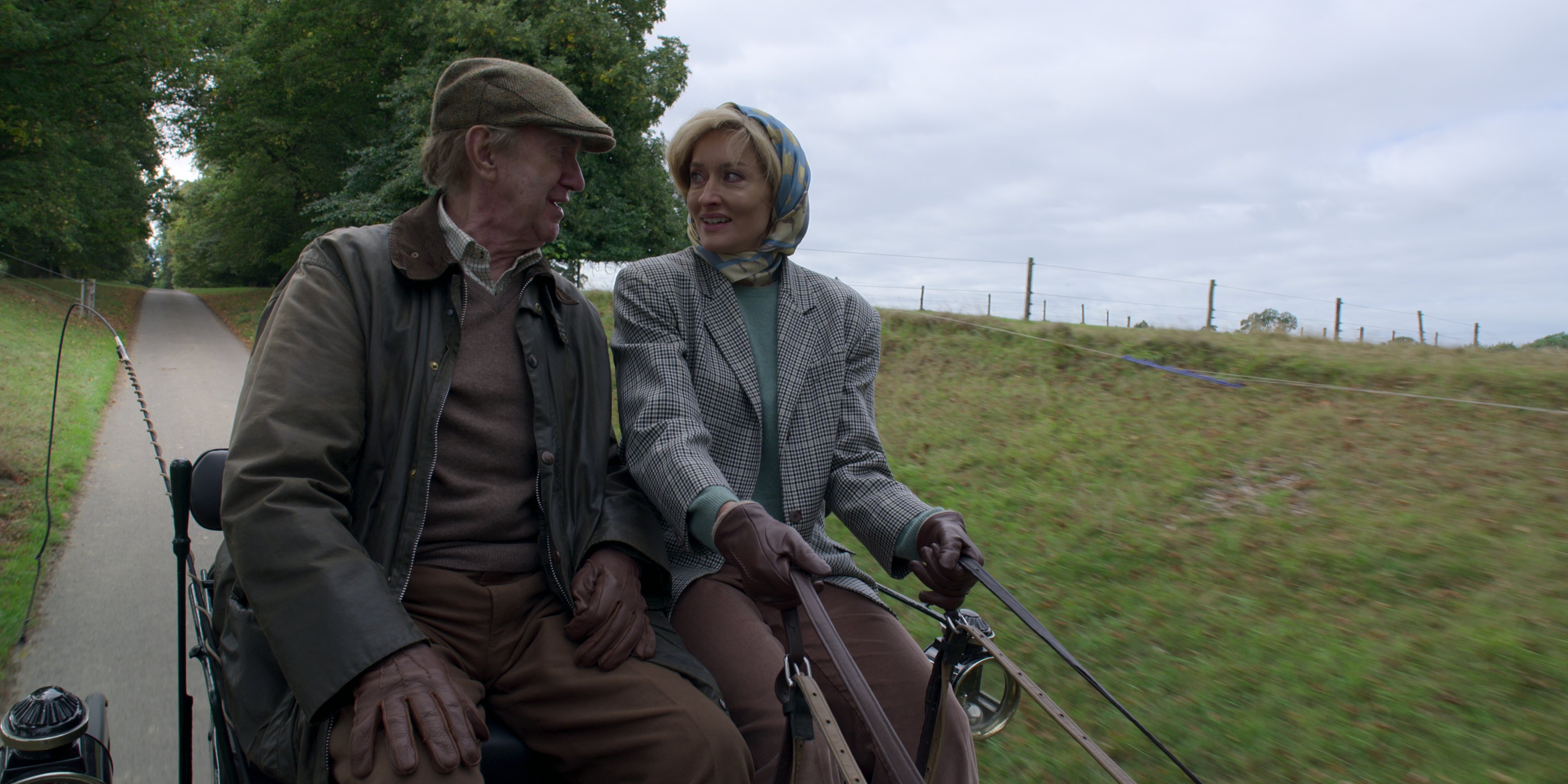
Meanwhile, Philip is doing his whole “man of letters” bit by educating himself on carriage design to the point where he’s harassing the workers in the smithy on their refurbishment efforts. We realize that Peter Morgan probably intends scenes like this to show that Philip is a curious and intellectual man with a lot of passions, but we thought he just looked like a self-important busy-body who couldn’t let the experts do their work without butting in. He unveils the pristine new carriage to an unsure Penny, who winds up enjoying the carriage ride with him. Morgan is clearly threading a needle here on the whole Penny storyline. We can’t honestly say whether Philip ever had an affair with her, but going by all of the public information, it seems highly unlikely. By all accounts, they truly did have a close but platonic friendship. In other words, there’s no real story here, but the show is trying to dance around the idea that there could have been. There are a lot of potentially interesting reasons as to why a man nearing seventy would befriend a much younger woman, but the show doesn’t seem particularly interested in unpacking them, except to suggest that he’s bored with his wife.
Andrew Morton has wiled his way into Diana’s confidence without having met her directly. James Colthurst agrees to start ferrying questions to her and taking the recorded tapes back to Morton. Before she begins, she makes a little speech to James, in another of those expositionary “reading the Wikipedia entry” dialogue moments. She explains (to her close confidante, who would not require this kind of explanation) that she has tried to confront Charles or to go to the Queen for support, but that she has been ignored or rebuffed. She mentions that she considered taking the boys and leaving the country, but that she would almost certainly lose custody of them to the crown; the same fate that befell her mother and made her own childhood so drearily unhappy. In other words, Diana had nowhere to go and no one to turn to in her unhappiness. As insanely reckless as it was for her to engage in this project, the show does a fairly decent job of trying to explain why she would do it. There follows an extended montage of Diana’s words (most of which can be heard in the documentary made from these tapes, Diana: In Her Own Words) about her life and marriage, most of which we already saw play out in the previous season. This presents something of a problem for this season, which deals almost entirely with the separation and divorce, which means there is a lot of rehashing of stuff we either already saw portrayed or has been mentioned so many times elsewhere that recounting it now almost seems like a waste of time. There’s an argument to be made that this season of The Crown may have paid a little too much attention to the Wales divorce, but that’s a discussion for the last few recaps of the season. Morton requests the names of friends who can corroborate Diana’s stories, and it’s genuinely sad to see her offer up the names of her aromatherapist, astrologer and accupuncturist. We suspect the point is to show how flighty Diana could be, but instead it depicts how incredibly isolated she was when the only names of confidantes she can give are those of people who are in her employ. We are also shown scenes of Andrew Morton discovering that his house has been broken into and James Colthurst being run off the road by a van. This further fuels Diana’s suspicions and she has her Kensington Palace apartment scanned for bugs. We are not really given enough information to determine if Diana actually had reason to be suspicious of these things.
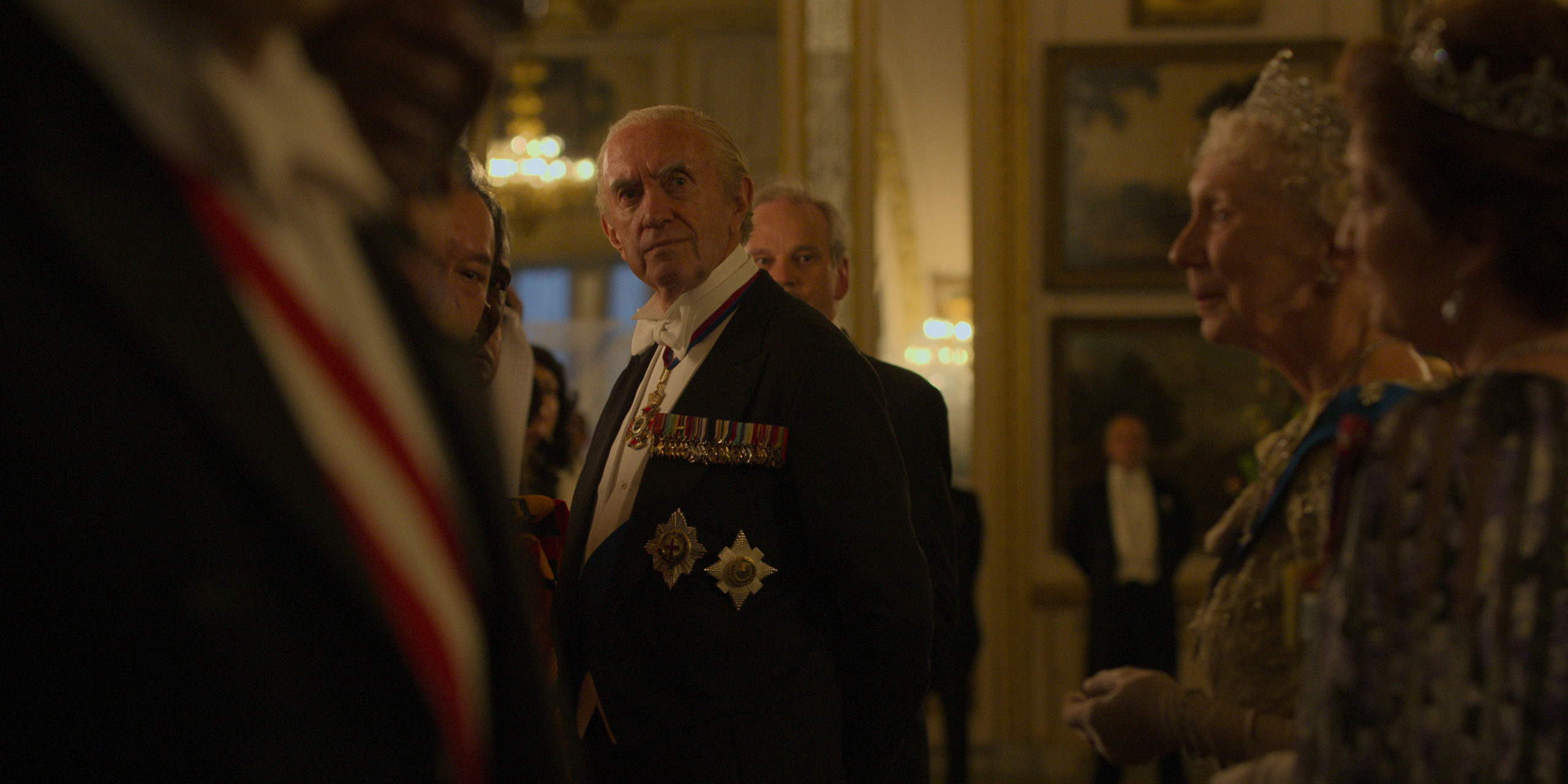
Penny tells Philip that she and Norton have heard several rumors about a book being written about Diana, with her cooperation. He goes to visit her at her apartment and basically gives her the same speech about being in “the system” and supporting the sovereign that he gave her in at least two previous scenes in the fourth season. This is something of a problem with The Crown and it’s only become more pronounced as the story progresses. Once you establish the personalities, perspectives, and idiosyncracies of extremely long-lived characters with fully defined and well-known stories, the only thing left to do is to recycle the same scenes and make the same points over and over again. It’s why the Penny Knatchbull story falls so flat. We already saw the Windsor marriage in peril because of Philip’s restlessness and we saw the characters resolve it. It’s just a rehash of previous points, except without the tantalizing prospect of royal adultery in the mix. Anyway, he tells Diana that she’s free to do whatever she wants, to find happiness in whatever way that suits her, so long as she remains loyal to the family in public. This is a hell of thing to ask, since her husband has been openly flaunting his own adultery for years. As he leaves, Philip notices the hawk flying overhead and we’re left wondering what the point is supposed to be. Diana seems only more defiant in the face of his advice and he seems particularly dense about it, reporting back to Elizabeth that all is fixed, thanks to his tough but loving advice. Elizabeth is still somewhat put out by the idea that her husband might believe that he can find happiness in his life away from her, but that seems a rather silly character point at this point in their marriage and history.
Andrew Morton’s book gets released and he predicts that the royal family is headed toward all-out war. The 1990s, the absolute messiest decade in royal family history, is officially kicked off. Let the games begin.
Todd Snyder Spring 2023 Collection Next Post:
THE CROWN Season 5 London Premiere
Please review our Community Guidelines before posting a comment. Thank you!


